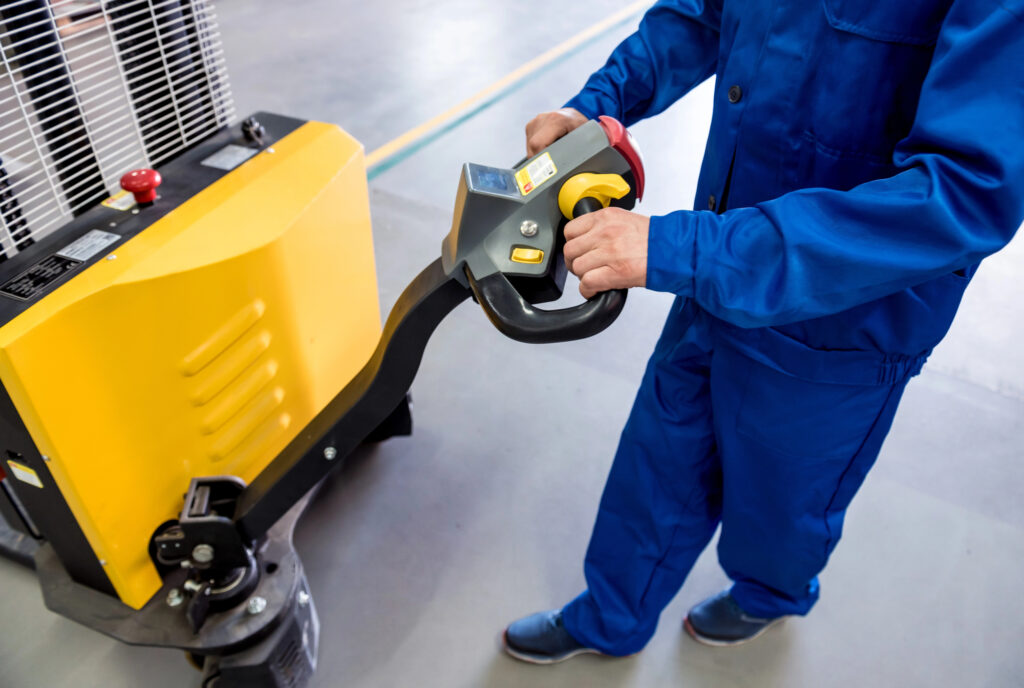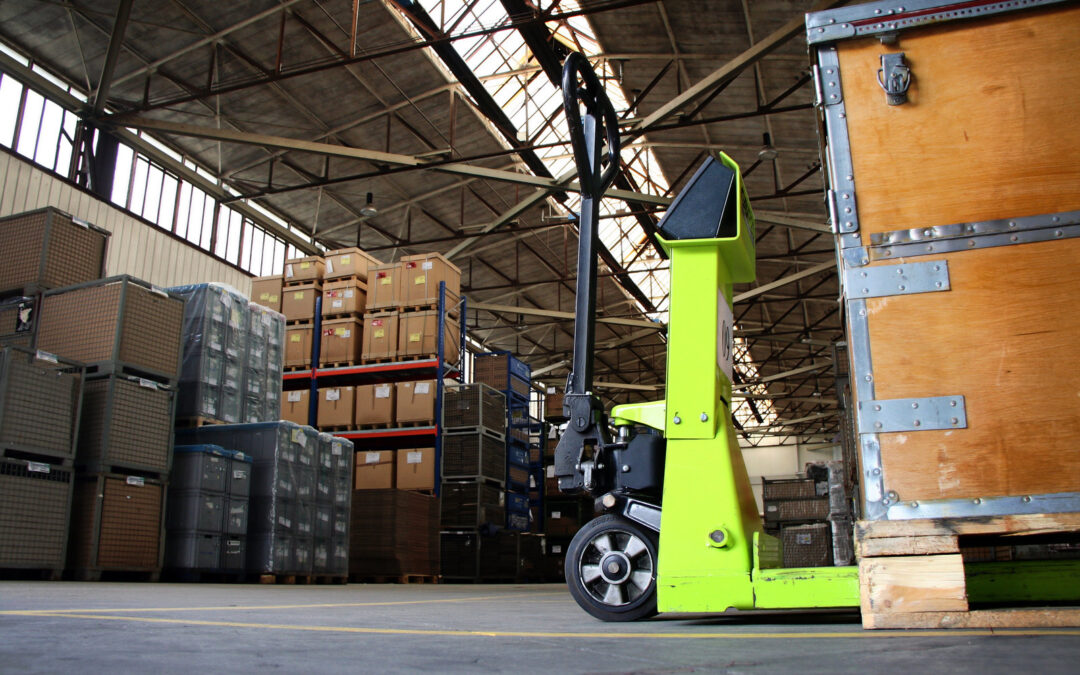Modern warehouses rely heavily on efficient material handling equipment to maintain smooth operations. Among the most essential pieces of warehouse equipment, electric pallet jacks stand out as workhorses that can dramatically improve productivity while reducing operator fatigue. However, selecting the right electric pallet jack for your specific needs requires careful consideration of multiple factors.
This guide will walk you through everything you need to know about choosing the perfect electric pallet jack for your warehouse operations. From understanding different types and key features to evaluating maintenance requirements, you’ll gain the knowledge necessary to make an informed decision that enhances your operational efficiency.
At JTS Forklift Service, we’ve dedicated ourselves to helping Utah businesses optimize their material handling equipment. Our expertise in electric forklifts and warehouse equipment maintenance has given us unique insights into what makes certain models excel in different environments.
Understanding Electric Pallet Jacks
Electric pallet jacks are powered material handling machines designed to lift, move, and position palletized loads with minimal physical effort from operators. Unlike manual pallet jacks that require significant physical strength, electric models use battery-powered motors to handle the lifting and moving functions.
Types of Electric Pallet Jacks
Walkie Models
Walkie electric pallet jacks require operators to walk alongside the machine while controlling its movement. These models are ideal for shorter distances and offer excellent maneuverability in tight spaces. They typically feature lower initial costs and are perfect for warehouses with limited aisle widths.
Ride-On Models
Ride-on electric pallet jacks allow operators to stand on a platform while operating the machine. These models excel in applications requiring longer travel distances, as they reduce operator fatigue significantly. Additionally, they often provide faster travel speeds compared to walkie models.
Stacker Models
Electric pallet stackers combine the functionality of pallet jacks with lifting capabilities that extend beyond basic pallet height. These versatile machines can stack pallets at various heights, making them suitable for warehouses that need both horizontal transport and vertical stacking capabilities.
Key Components
Understanding the main components helps you evaluate different models effectively. The electric motor provides the power for lifting and propulsion functions. Battery systems determine runtime and charging requirements. Control systems include handle-mounted controls for direction, speed, and lifting functions. Finally, load wheels and casters affect maneuverability and floor protection.
Factors to Consider When Choosing an Electric Pallet Jack
Load Capacity Requirements
Determining the appropriate load capacity represents one of the most critical decisions in selecting warehouse equipment. Start by analyzing your typical load weights, including both average and maximum loads you’ll encounter regularly.
Standard electric pallet jacks typically handle loads ranging from 3,000 to 8,000 pounds. However, heavy-duty models can accommodate loads up to 10,000 pounds or more. Always choose a model with a capacity exceeding your heaviest regular loads to ensure safe operation and equipment longevity.
Consider future growth when evaluating capacity needs. If your business expects to handle heavier loads or increase volume significantly, investing in higher-capacity equipment now can prevent costly upgrades later.
Warehouse Size and Layout Considerations
Your facility’s physical characteristics directly impact which electric pallet jack will perform best. Narrow aisles require models with compact dimensions and tight turning radii. Measure your narrowest aisles and compare these dimensions with manufacturer specifications for different models.
Turning radius becomes especially important in warehouses with congested layouts or multiple direction changes. Some models feature 90-degree steering capabilities that allow operation in extremely tight spaces.
Consider travel distances within your facility. Longer distances favor ride-on models that reduce operator fatigue, while shorter distances may be perfectly suited for more economical walkie models.
Floor Conditions Impact
Floor surfaces significantly affect electric pallet jack performance and longevity. Smooth, level concrete floors provide ideal operating conditions for most models. However, many warehouses have less-than-perfect floors that require special consideration.
Rough or uneven surfaces demand models with robust suspension systems and durable wheel materials. Some manufacturers offer specialized wheels designed for challenging floor conditions, including outdoor use or surfaces with debris.
Expansion joints, cracks, and surface irregularities can cause premature wear on standard wheels. Models with larger wheels or pneumatic options often perform better on imperfect surfaces.
Battery Life and Charging Options
Battery performance directly impacts productivity and operational costs. Evaluate your daily usage patterns to determine the required runtime between charges. Most electric pallet jacks operate for 6-8 hours under normal conditions, but high-usage applications may require models with extended battery life.
Charging infrastructure plays a crucial role in equipment selection. Standard charging typically requires 8-12 hours, while fast-charging options can reduce downtime significantly. Some facilities benefit from opportunity charging capabilities that allow partial charging during breaks or shift changes.
Consider battery maintenance requirements as well. Some models feature maintenance-free batteries, while others require regular watering and cleaning. Factor these ongoing costs into your decision-making process.
Ergonomics and Operator Comfort
Operator comfort directly affects productivity and safety. Handle design should accommodate operators of different heights while providing comfortable grip positions. Controls should be intuitive and easily accessible without requiring awkward hand positions.
Features that reduce operator fatigue include cushioned platforms on ride-on models, adjustable handles, and smooth acceleration and deceleration. Some advanced models offer ergonomic enhancements like shock-absorbing systems that reduce vibration transmission to operators.
Safety Features
Modern electric pallet jacks incorporate numerous safety features that protect both operators and equipment. Emergency stop mechanisms allow immediate shutdown in dangerous situations. Automatic braking systems engage when operators release controls or step off platforms.
Operator presence sensors prevent unauthorized use and ensure machines stop when operators are not in proper positions. Additionally, some models feature travel speed restrictions that automatically reduce speed in reverse or when navigating tight areas.

Comparing Different Models and Brands
Toyota Material Handling
Toyota offers reliable electric pallet jacks known for durability and low maintenance requirements. Their models typically feature excellent build quality and comprehensive warranty coverage. However, initial costs tend to be higher than some competitors.
Crown Equipment Corporation
Crown specializes in ergonomic designs with advanced control systems. Their electric pallet jacks often include innovative features like regenerative braking and advanced battery management systems. These machines excel in high-usage applications but require a higher initial investment.
Raymond Corporation
Raymond focuses on productivity-enhancing features and operator comfort. Their models often include advanced diagnostics and fleet management capabilities. While prices are competitive, service network availability varies by region.
Model Comparison Considerations
When comparing specific models, evaluate the total cost of ownership rather than just the initial purchase price. This includes maintenance costs, parts availability, energy consumption, and expected lifespan.
Reliability ratings from current users provide valuable insights into real-world performance. Additionally, consider manufacturer support quality, including technical assistance and parts availability in your area.
Maintenance and Service Requirements
Regular maintenance extends equipment life significantly while reducing unexpected downtime. Electric pallet jacks require several routine maintenance tasks to perform optimally.
Essential Maintenance Tasks
Battery maintenance represents the most critical aspect of electric pallet jack care. This includes regular cleaning of terminals, checking electrolyte levels in non-sealed batteries, and ensuring proper charging practices. Proper battery care can double equipment lifespan while maintaining peak performance.
Lubrication of moving parts prevents premature wear and ensures smooth operation. Key lubrication points include wheel bearings, lift mechanisms, and pivot points. Follow manufacturer recommendations for lubricant types and service intervals.
Regular inspections help identify potential problems before they cause equipment failure. Check for damaged wheels, worn electrical connections, and hydraulic leaks during routine inspections.
Professional Service Benefits
While operators can handle basic maintenance tasks, professional service ensures comprehensive care that maximizes equipment reliability. Experienced technicians can identify developing problems that untrained personnel might miss.
At JTS Forklift Service, our electric forklift specialists bring over 25 years of combined experience to every service call. We provide comprehensive maintenance services, including battery system diagnostics, electric motor repairs, and charging system inspections. Our 24/7 availability ensures your warehouse equipment receives attention whenever issues arise.
Professional service also ensures compliance with safety regulations and manufacturer warranty requirements. Many warranty claims require documented professional maintenance to remain valid.
Making the Right Choice for Your Operations
Choosing the right electric pallet jack requires assessing your capacity needs, operating environment, and usage patterns while balancing these with your budget. Consider long-term costs, as higher upfront prices often mean lower maintenance, longer lifespan, and better productivity. Ensure local service support is available to minimize downtime. A well-chosen pallet jack will boost warehouse efficiency and provide a strong return on investment.
Ready to optimize your material handling operations? Contact JTS Forklift Service at (801) 300-2290 or email office@jtsforklift.com for expert guidance on selecting the perfect electric pallet jack for your warehouse needs. Our experienced team can also provide comprehensive maintenance and repair services to keep your equipment running at peak performance.
Schedule a consultation today to discover how the right warehouse equipment can boost your operations!
GET IN TOUCH WITH US TODAY
